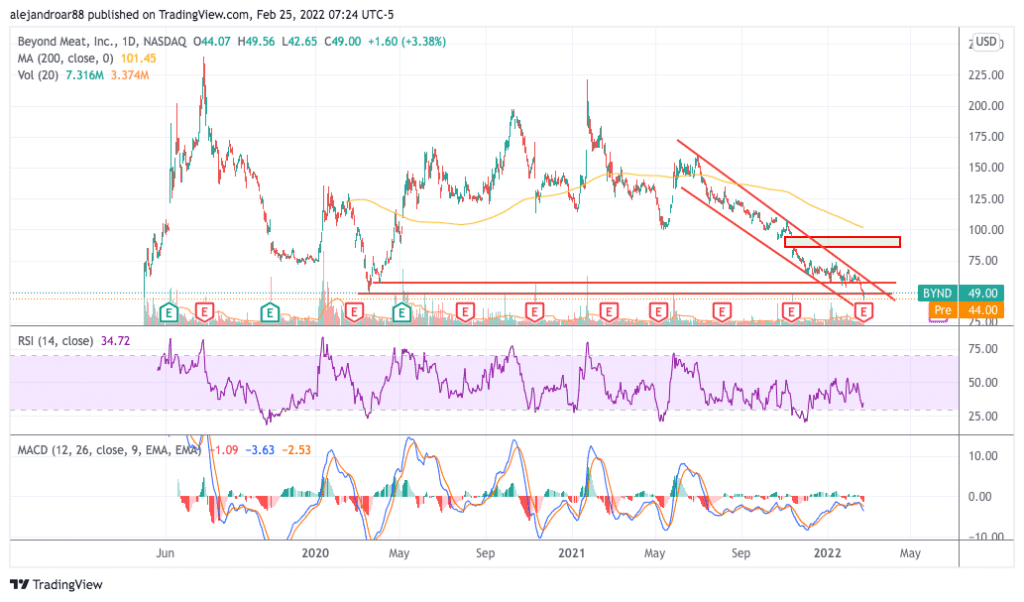Beyond Meat Stock Down 8% Today – Time to Buy BYND Stock?
Please note that we are not authorised to provide any investment advice. The content on this page is for information purposes only.
The price of Beyond Meat stock is dropping nearly 8% in pre-market stock trading action this morning following the release of the firm’s financial results covering the fourth quarter of the 2021 fiscal year as revenues landed below the market’s expectations while losses accelerated.
For the three months ended on 31 December, Beyond Meat reported sales of $100.7 million resulting in a 1.2% year-on-year drop compared to the same period a year ago while they came in slightly below the market’s consensus estimate for the period.
Retail sales in the United States experienced the most pronounced drop as they decline 19.5% compared to Q4 2020 as Beyond Meat keeps struggling to entice end consumers to taste and fully incorporate its plant-based meat into their regular diet. US sales accounted for 70% of BYND’s top-line results while US retail sales accounted for 50% of the total.
Foodservice sales reported a 34.7% year-on-year increase in the US while international sales as a whole increased 22.6% primarily aided by higher foodservice sales.
Gross margins during the period fell sharply at 14.1% resulting in a 1,080 basis points drop compared to a year ago. The company cited inventory write-offs, discounts, and higher manufacturing costs as the primary reason for this decline in its top-line profitability.
Net losses for the period ended at $80.4 million resulting in GAAP losses per share of $1.27. As a percentage of revenue, this results in a net margin of minus 79.8%. Analysts were expecting losses per share of $0.68.
For this year, the company is expecting to report sales ranging between $560 and $620 million resulting in a 21% to 33% increase compared to last year. This forecast slightly exceeded the market’s estimate of $611.4 million for the period.
The combination of higher-than-expected losses, lower sales in the US market, and deteriorating top-line profitability is possibly the reason why Beyond Meat stock is dropping this morning.
What could come next for this vegan stock? In this article, I’ll be assessing the price action and fundamentals of BYND stock to outline plausible scenarios for the future.
67% of all retail investor accounts lose money when trading CFDs with this provider.
Beyond Meat Stock – Technical Analysis

The price of Beyond Meat stock has declined nearly 25% since the year started while it is trading around 70% below its 52-week high of $162.8 per share.
This decline has been prompted by a combination of negative catalysts including a sustained drop in US retail sales, supply-chain related struggles, the resignation of the company’s Chief Operating Officer, and changes in the macroeconomic landscape.
The price is now tagging a key area of support at $50 per share. A decline below this area will push BYND stock to all-time lows and it could accelerate the downtrend for the stock.
The odds of this happening have increased after the company released this earnings report as the results were disappointing.
Momentum indicators remain heavily depressed as the Relative Strength Index (RSI) is standing at 35 while failing to climb above 50 multiple times. Meanwhile, the MACD is still standing in negative territory and has recently drifted below the signal line.
Moving forward, if this pre-market drop spills over to the live session as-is, the downside risk for BYND stock in the near future could be quite high.
Beyond Meat Stock – Fundamental Analysis
The decline in Beyond Meat’s US retail sales continues to be a troubling factor that points to decreasing consumer adoption. Moreover, even though the reduction in the company’s gross margins can be traced back to the global supply chain crisis, the appearance of inventory write-offs and discounts as relevant influences on the firm’s top-line results is also an indication that demand is weakening.
In 2021, Beyond Meat’s cash burn ended at $437 million compared to just $97 million the firm burned in the previous year. Higher inventories contributed significantly to this situation as they increased $122.7 million during the period while capital expenditures more than doubled to $136 million.
By the end of the year, Beyond Meat had $733.3 million in cash and equivalents. The company will need to keep investing in expanding its manufacturing capabilities to scale up its sales. This means that capital expenditures should remain elevated for the foreseeable future.
Based on the current scenario, it is highly likely that BYND will have to raise more capital this year to keep growing. This increases dilution risks for shareholders as the company might opt to sell shares instead of taking on more debt as macroeconomic conditions have changed significantly compared to last year.
Including today’s pre-market downtick, BYND’s market capitalization is standing at $2.9 billion meaning that the company is trading at 4.7 times its forecasted sales for next year. This multiple seems rather high for a company that is struggling on so many fronts. That said, it can be justified if the brand and patents owned by the firm for its innovative products are considered valuable.
Overall, Beyond Meat remains a risky bet considering the difficulties that the company is having to get consumers to adopt its products.






